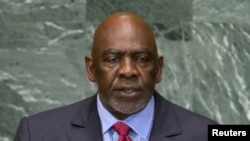The Economic Community of West African States (ECOWAS) has condemned Mali’s army over its role in forming the resignation of interim Prime Minister Cheikh Modibo Diarra.
Diarra resigned early Tuesday after he was arrested by soldiers as he prepared to leave on a trip outside the country.
“We condemn it [the army action] and, indeed, they should stay out of the [political] process that we have been working on painstakingly in order to restore Mali to democratic governance,” said ECOWAS communications director Sonny Ugoh. “The military should [practice] the proper ethos of their professional requirement and stay away completely from the political process in that country.”
Ugoh said regional leaders have begun consultations to find a solution to the latest twist in the Mali crisis following the prime minister’s resignation.
“There is intense consultations going on in the region, and you can be sure that the region will respond robustly to this situation,” said Ugoh.
His comments came after soldiers arrested the prime minister at his home as he prepared to leave on a trip to France. Hours later, Diarra appeared on television and read a statement of resignation.
Ugoh called on the international community to expedite action on a plan by African leaders for a military intervention in Mali.
“The international community should also join us in condemning this and working together [with us] to make sure that the military stay within the confines of their mandate,” continued Ugoh, “so that we can proceed with the process that we have been working on to restore the country to full democratic governance through elections that are transparent, free and fair, that would be able to produce a president and a legislature that will proceed to run the country based on democratic principles.”
Members of the U.N. Security Council also have condemned the arrest of the prime minister, his resignation and the dismissal of the Mali government.
U.N. Secretary-General Ban Ki-moon for Mali’s military to stop interfering in politics and urged the Mali’s leadership to resolve disputes through peaceful means.
Ugoh also warned that any delay mounting a military intervention in northern Mali, where al-Qaida linked Islamic militants have seized control.
“For every day that we have to wait in order to get this mandate and the international support that will enable us address the issue in the north of Mali, really creates additional complications for this process,” said Ugoh. "I think it’s important for the international community to work as expeditiously as possible, in line with the request of West African regional leaders and in line with the request of the African Union, for an appropriate mandate to enable have the muscle to be able to deal with the situation in Mali.”
Diarra resigned early Tuesday after he was arrested by soldiers as he prepared to leave on a trip outside the country.
“We condemn it [the army action] and, indeed, they should stay out of the [political] process that we have been working on painstakingly in order to restore Mali to democratic governance,” said ECOWAS communications director Sonny Ugoh. “The military should [practice] the proper ethos of their professional requirement and stay away completely from the political process in that country.”
Ugoh said regional leaders have begun consultations to find a solution to the latest twist in the Mali crisis following the prime minister’s resignation.
“There is intense consultations going on in the region, and you can be sure that the region will respond robustly to this situation,” said Ugoh.
His comments came after soldiers arrested the prime minister at his home as he prepared to leave on a trip to France. Hours later, Diarra appeared on television and read a statement of resignation.
Ugoh called on the international community to expedite action on a plan by African leaders for a military intervention in Mali.
“The international community should also join us in condemning this and working together [with us] to make sure that the military stay within the confines of their mandate,” continued Ugoh, “so that we can proceed with the process that we have been working on to restore the country to full democratic governance through elections that are transparent, free and fair, that would be able to produce a president and a legislature that will proceed to run the country based on democratic principles.”
Members of the U.N. Security Council also have condemned the arrest of the prime minister, his resignation and the dismissal of the Mali government.
U.N. Secretary-General Ban Ki-moon for Mali’s military to stop interfering in politics and urged the Mali’s leadership to resolve disputes through peaceful means.
Ugoh also warned that any delay mounting a military intervention in northern Mali, where al-Qaida linked Islamic militants have seized control.
“For every day that we have to wait in order to get this mandate and the international support that will enable us address the issue in the north of Mali, really creates additional complications for this process,” said Ugoh. "I think it’s important for the international community to work as expeditiously as possible, in line with the request of West African regional leaders and in line with the request of the African Union, for an appropriate mandate to enable have the muscle to be able to deal with the situation in Mali.”





